Picture
Your Present Location: HOME> Picture4th Symposium on Think Tank Construction held in RDCY
On November 11th, the 4th Symposium on the Construction of New Type of Think Tank with Chinese Characteristics, jointly sponsored by the Chongyang Institute for Financial studies at Renmin University of China(RDCY) and the Editorial Department of Think Tank: Theory and Practice at Documentary Intelligence Center of Chinese Academy of Sciences, was successfully held in Beijing. Experts and scholars from universities and research institutions such as Renmin University of China, Chinese Academy of Social Sciences, Chinese Academy of Sciences, Shanghai Academy of Social Sciences and the Institute of Macroeconomics of National Development and Reform Commission, attended the seminar, analyzing new issues on the construction of think tanks, and discussing new paths of strengthening the capacity of new types of think tanks with Chinese characteristics.
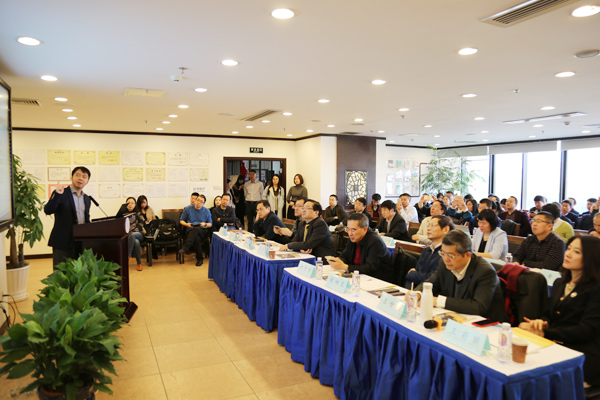
Wang Wen, the executive dean of RDCY, and Liu Xiwen, the deputy director of the Documentary Intelligence Center of the Chinese Academy of Sciences and chief editor of Think Tank: Theory & Practice, delivered opening speeches. Chu Jingli, deputy executive editor of Think Tank: Theory & Practice, presided over the ceremony.
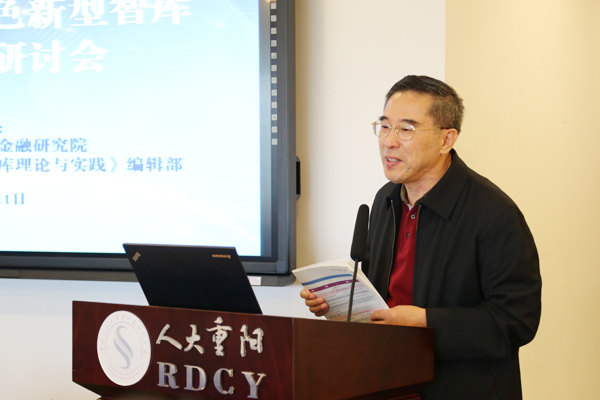
Chu Jingli, deputy executive editor of Think Tank: Theory & Practice
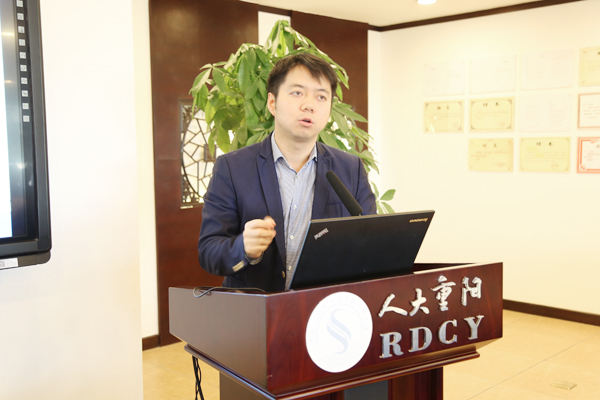
Wang Wen, the executive dean of RDCY
In Dean Wang Wen’s speech, he pointed out that in the past five years, there have appeared many active think tanks in China, but there are no super-era suggestions; think tanks have held a lot of events, but there is still lacking high-level experts; Chinese think tanks have initially formed their own brands, but there is still no world-level influence; the government has cooperated with think tanks frequently, but there still needs more interactions; think tanks have began to communicate with the society, but there isn’t forming reputation in thought yet. He added that Chinese think tank will enter a long stage of removing the fake and valuing the real.
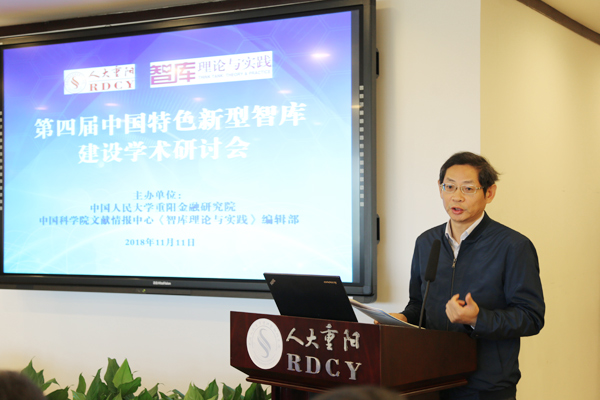
Liu Xiwen, the deputy director of the Documentary Intelligence Center of the Chinese Academy of Sciences
In Liu Xiwen’s speech, he spoke that we should deepen our understanding of the characteristics of think tanks, emphasize the social and institutional nature of think tanks, and establish evidence-based think tanks. He stressed that the development of think tanks should be a trend toward specialization, improve the effectiveness of decision-making, enhance public recognition, experts’ agreements and acceptance of decision makers through professional communication.
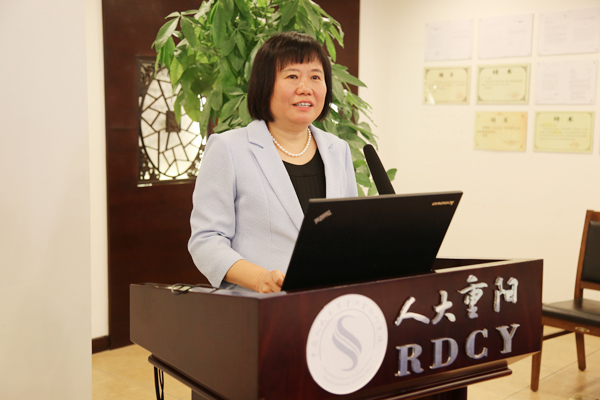
Hu Haibin, deputy dean of RDCY
Next, the meeting entered the session of experts’ keynote speeches. Hu Haibin, deputy dean of RDCY, and Yang Wandong, professor of the School of Economics of Renmin University of China, presided over two panels respectively.
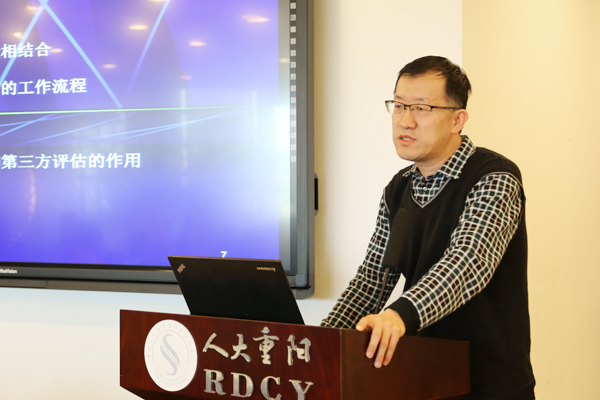
Jing Linbo, dean of the CASSES
Jing Linbo, dean of the CASSES, noted that the aim of think tank evaluation system AMI is to promote the construction of think tanks, to create a direction for think tanks, and to form an interactive platform for researchers, decision-makers and promoters. We must solve three major problems on construction of think tanks: independence, pluralism and speaking right.
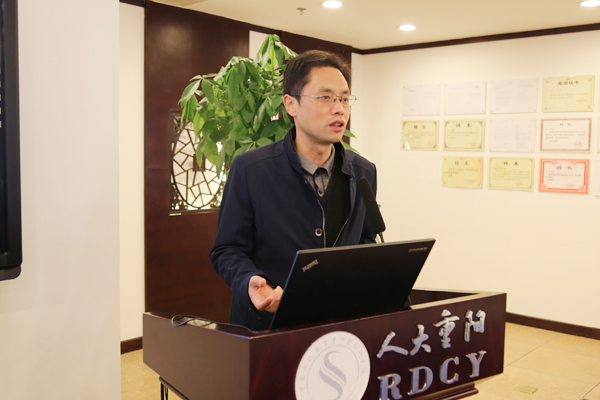
Li Wan, deputy director of the Shanghai Institute of Science
Li Wan, deputy director of the Shanghai Institute of Science believes that think tanks are specialized agencies for content being paid, information collecting, knowledge creating and ideas spreading. The productization development of think tanks is also an important trend, he added.
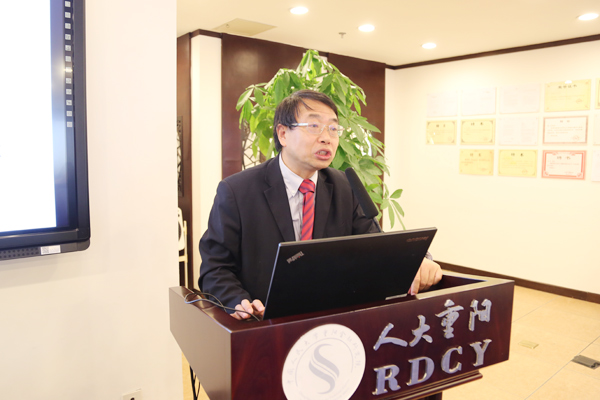
Yang Wandong, professor of the School of Economics of Renmin University of China
Yang Wandong expressed his understanding for think tanks from the quality of results, the problems of development, the path of quality improvement and the encouraging mechanism. He argues that the development of new types of think tanks should be based on their own human resources advantages, professional development, personalized design, socialization organization, market-oriented encouragement and muti-level responsibility.
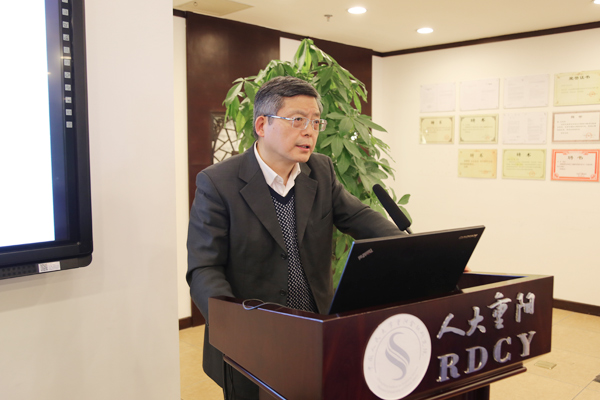
Wang Shiwei, a researcher at the Information Institute of the Shanghai Academy of Social Sciences
Wang Shiwei, a researcher at the Information Institute of the Shanghai Academy of Social Sciences, emphasized that think tanks should serve the decision-making, and should provide appropriate thought achievements and suggestions.

Li Zhongshang, a senior fellow at RDCY
Li Zhongshang, a senior fellow at RDCY, first reviewed the developing history of China’s think tanks. He said that today is the second time for rising of think tanks. The first time was the development of soft science proposed by the 13th National Congress. He also mentioned that muti-level leaders should adapt to the requirements of the new era, learn to use decision-making science and think tanks, and take victory in reform and construction with democratic and scientific decision-making.
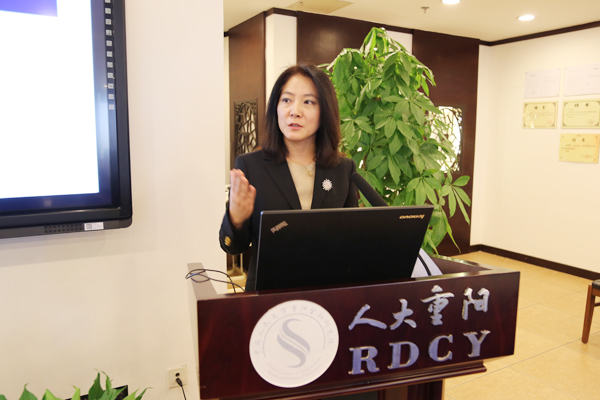
Wang Lili, deputy dean of the National Development and Strategy Research Institute of Renmin University of China
Wang Lili, deputy dean of the National Development and Strategy Research Institute of Renmin University of China, spoke with the theme of “Think Tank: Thought Innovation and Dissemination of Public Opinions”. Focusing on the core competitiveness of China’s think tanks, she clarified the future construction of the think tank from the positioning and function of think tanks, the development trend of the think tanks globally, the status quo of China’s think tanks and how to improve the core competitiveness.
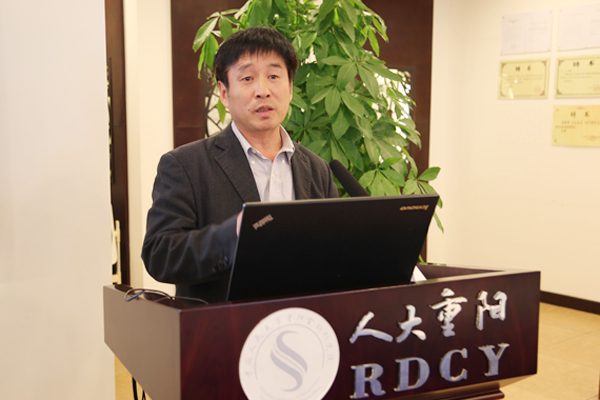
Liu Xizhong, the Director of Study Centre of Social Sciences Association in Zhejiang Province
Liu Xizhong noted that the organization and management of think tanks are confronted with some problems. He believes that think tanks should aim to create energy and innovation, produce results and talents; establish a modern institution management system and improve the quality of internal governance; build a new type of think tank system and better the quality of external management of think tanks.
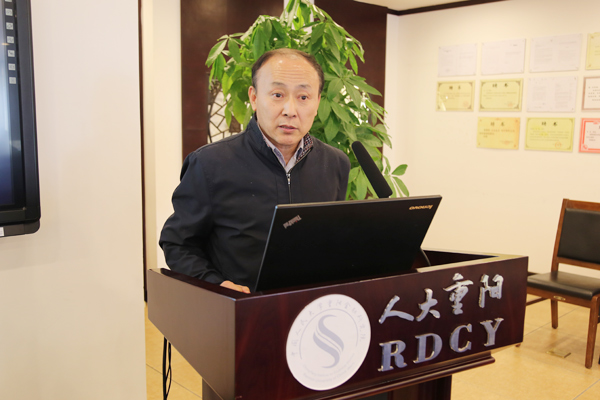
Cheng Hong, a researcher at GEI
Cheng Hong mentioned that predictability is the essence of the think tank report which requires independent thinking and problem-oriented support. The think tank report is not only a summary of the actual problems, but also a deductive reasoning. A mature theoretical viewpoint is gradually formed on the basis of long-term research, he added.
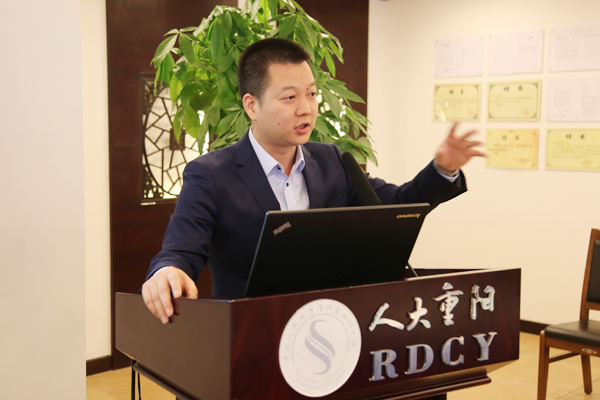
Zeng Zhimin, an associate researcher at the Institute of Public Policy Studies at South China University of Technology
Zeng Zhimin, an associate researcher at the Institute of Public Policy Studies at South China University of Technology, made a keynote speech on "The Role of Think Tanks in the Construction of Knowledge Systems with Chinese Characteristics." He believes that the main role of think tanks is to bridge the gap between the theory and practice, and to select the fittest through policy and market mechanisms.
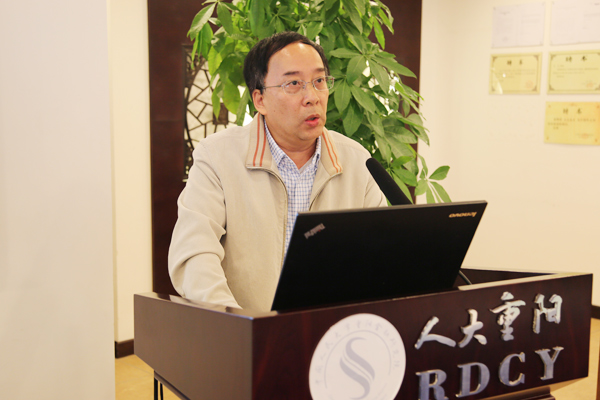
Li Huiming, a researcher at China Institute of Contemporary International Relations
Li Huiming, a researcher at China Institute of Contemporary International Relations, discussed the “three aspects should be done“ and “three aspects should not be done” in the construction of China’s think tanks . He believes that in order to promote the development of China's think tanks, we should seek truth from facts and focus on new features; we should pay attention to effectiveness when making suggestions; we should make further research and emphasize strategic forecasts. We shouldn’t worship and imitate overseas think tanks; we shouldn’t copy from others; we shouldn’t be self-deceptive.
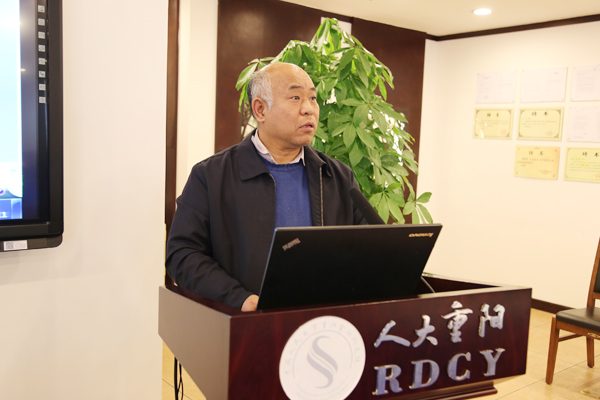
Yang Yiyong, the Director of the Institute of Macroeconomics of National Development and Reform Commission
Yang Yiyong, the Director of the Institute of Macroeconomics of National Development and Reform Commission, said that there are six aspects in the research on the construction of China’s top-level think tanks. The first is directional, the second is strategic, and the third is original. We should be based on high-end positioning, concentrate on the main direction, highlight professional advantages, and pay attention to the quality of results. The fourth is scientific, the fifth is comprehensive, and the sixth is open. If there aren’t new talents in the think tank, it is impossible to be energetic and innovative.
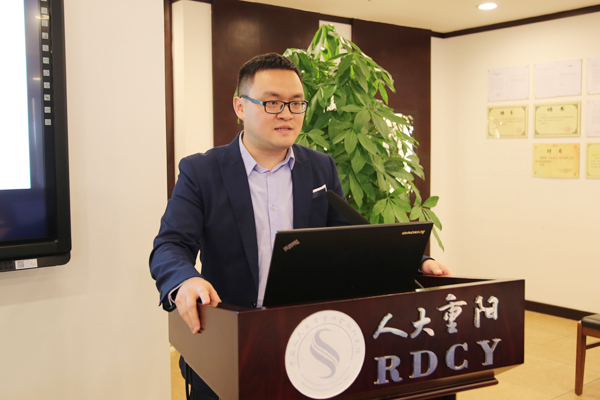
Huang Hao, assistant to the dean of Fudan Development Institute
Huang Hao, assistant to the dean of Fudan Development Institute, stated that what the university think tank can contribute to the country and the world are fundamentally spirit and ideal apart from strategy and countermeasures, ideas and wisdom. He argues that the university think tank has three advantages: the quality of the research, the value of the spirit, and the dynamic relationship with the government.

Yang Guang, researcher of Research Department at Party School of the Shandong Provincial Committee of CPC
Yang Guang, researcher of Research Department at Party School of the Shandong Provincial Committee of CPC, expounded how to establish a new type of think tank through a vivid example of Dong’e Think Tank. He summarized the experience of Dong’e Think Tank and said that we must create a good development environment for developing think tanks, and strive to reflect local characteristics and innovate service mechanisms.
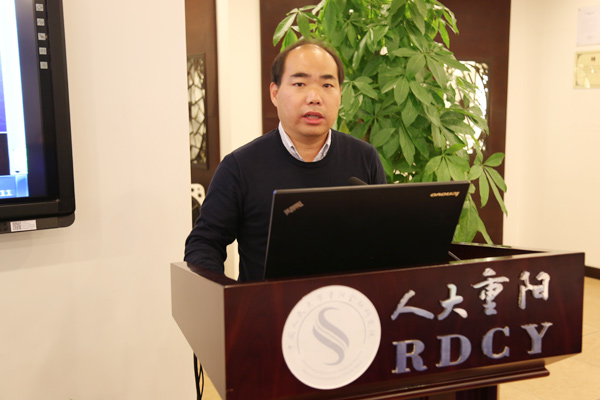
Xu Li, associate researcher at Chinese Academy of Military Sciences
Xu Li, associate researcher at Chinese Academy of Military Sciences, expressed that think tanks should produce new thoughts, new ideas, new theories, and new strategies, he added.
At the end of the meeting, Professor Chu Jingli concluded that the results of the seminar were fruitful. Experts from different fields such as the university, research institute, party school, enterprise, and military institutions achieved a lot of mutual understandings on the construction of think tanks, and raised many questions. He hope that the construction of a new type of think tank with Chinese characteristics will achieve much more brilliant results.























































































 京公网安备 11010802037854号
京公网安备 11010802037854号





